
 Holy
Trinity & St Mary
|
|
|
|
|
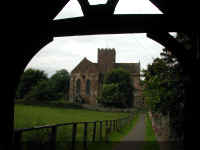
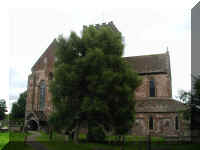
|
|
1 |
2 |
|
1 The classic photograph of the Abbey
church taken through the lych gate at the roadside.
2 A closer view of the
south side, partly obscured by the tree growing close to the south
porch.
|
|
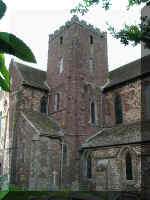
|
|
3 |
|
3 The tower, dating from the early
17th century, set in the corner of the south wall and porch.
|
|
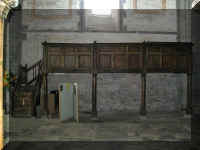 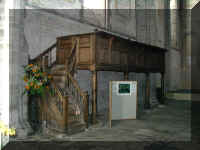
|
|
4 |
5 |
|
4 & 5 The oak gallery constructed in
the 17th century, and which stands against the west wall of the
crossing.
|
|
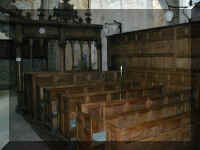
|
|
6 |
|
6 The choir stalls
constructed by John Abel at about the same time as the gallery.
|
|
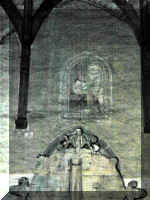
|
|
7 |
|
7 This wall painting depicts King
David with his harp, looking down into the transept from the west
wall.
|
|
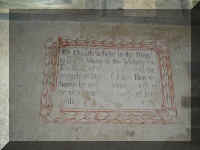 |
|
8 |
"Death where is
thy sting?
O grave where is thy victory?"
Numerous such texts are to be found on the walls
of the transepts and crossing.
|
|
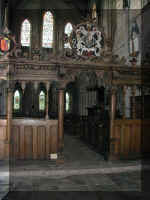 |
|
9 |
|
9 The screen by John Abel with
the Stuart 's Royal Coat of Arms surmounting the entrance to the
Choir.
|
|
|
History
of the early church
Constructed of dark Herefordshire sandstone
speckled with white lime, the old Abbey at Abbey Dore is in fact
the chancel, crossing and transepts of an old Cistercian Abbey. It
was founded in 1147 although most of what remains dates from a
rebuilding of the original structure which commenced in 1180 -
right on the transitional date between Norman and Early English
styles of architecture. The change between the two is clearly
marked in the building of the ambulatory and the details of the
carving of the capitals and arches.
Interior contrasts with exterior, in that inside
the walls and columns are of limestone and there are splendid 17th
century fittings. After the dissolution of the monasteries Abbey
Dore fell into ruin, but in the 1630s the Scudamore family rescued
it for the parish under the influence of the high church
Archbishop Laud. They raised the present battlemented tower,
inserted stained glass into the eastern lancet windows, and
employed a talented carpenter - one John Abel (1577-1664), whose
job it was to raise the new timbered roof, and to construct and
carve the choir stalls and screens.
The whole is a splendid example of 17th century
classicism, a "squirearchy Baroque" in celebration of
the Manor, the church and the Stuart crown. [Jenkins
- England's 1000 Best Curches]
|
|
The
Gallery
The old oak gallery standing against the west wall
of the crossing is his work also.
|
|
|
Dove's reference for the bells |
| Abbey
Dore, Herefordshire, Holy Trinity & S Mary, 6,
9¼cwt in A flat. Anti-clockwise.
|
|
|
ACCESS |
| Map reference : SO387303
Open at the time of our visit, the church appears
to be open for visitors most of the time.
|
|
|
Photographs: ©
Edwin Macadam 2002
|
Please see our
Home Page
for important copyright notice
|

|
|

|
|
|

|
|
|
|
|
SEARCH THIS SITE |
|
|
This
site has been constructed by, and remains the copyright of,
its authors,
Edwin and Sheila Macadam,
Shelwin, 30, Eynsham Road, Botley,
Oxford OX2 9BP
|
|
| ©
July 2001 -
|
|

